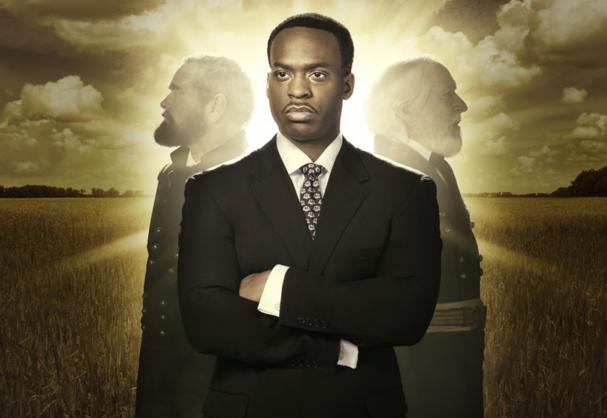‘Appomattox’ and Solomon Howard: Songs Echoing Through American History
By • November 16, 2015 0 862

There’s a kind of historic convergence around the new, extensively revised production of the epic and ambitious opera, “Appomattox,” making its Washington National Opera premiere Saturday, Nov. 14, at the Kennedy Center’s Opera House.
Originally penned by renowned composer Philip Glass and librettist Christopher Hampton in 2007 around the time when challenges to the voting rights act were being mounted, this “Appomattox” celebrates historic anniversaries of that same Voting Rights Act 50 years ago and the end of the Civil War 150 years ago. It also comes at a time of increasing racial tensions across the U.S. over police shootings of African Americans and demonstrations over overt acts of racism on U.S. college campuses, one of which led to the resignation of the University of Missouri president.
The very presence of “Appomattox,” which envisions critical meetings between presidents and civil rights leaders—Frederick Douglass with Abraham Lincoln and Martin Luther King, Jr., with Lyndon Baines Johnson—echoes loudly in these times. Douglass, a former slave and eloquent abolitionist, was trying to influence Lincoln, while King was negotiating voting rights with Johnson.
The issues may be different in 2015, but the central issue remains race in America and how both black and white Americans are still struggling with it.
The opera echoes mightily for Solomon Howard, the rising star African American bass, who takes on the roles of Douglass and King and feels the weight of that responsibility, as well as the convergence of time and place in this city, where he grew up, with he and his family often struggling.
“The opera really speaks to this place—this is where Douglass lived, where Lincoln lived, where King gave that glorious speech and met with Lincoln, where civil rights demonstrations and anti-war demonstrations were part of our landscape,” said Howard, who lives in Virginia. “Everywhere you look there are reminders of the struggle for freedom and civil rights, and what it meant. It echoes in my own life, also.”
“So, yes, I feel that responsibility to do Douglass and King justice, to do right by them, historically and artistically,” he said. “But you can’t be self-conscious about this in the sense that you’re thinking about it every second. These are real people, and my job is to make them real to the audience not stick figures and you do this through singing and acting. Acting, I feel, is critically important to opera, and that didn’t always used to be the case.
“You know, you can feel that atmosphere in this city—this is a place where the news plays out daily, and the reminders are all around us—the Lincoln monument and King’s special place. This is where much of our history, America’s history, happened and played out publicly.”
Howard says the music of Glass, who is considered a minimalist and atonal, is a challenge, but a welcoming one. “People may be surprised,” he said. “The music in some ways functions like a score for a movie, keying emotions. It’s powerful and in terms of singing, if not listening, difficult, certainly.
To some extent, Howard, who rose into the ranks of leading performers with the WNO and elsewhere from the opera company’s Domingo-Cafritz Young Artist program, has some experience in portraying an American icon. Howard starred in the stirring one-hour opera, “Approaching Ali,” which had its world premiere at the Kennedy Center two years ago, a production that put the spotlight squarely on him. “It’s daunting,” he said. “But it’s the kind of challenge where you can bring much of yourself to the project, you’re making a difference in ways that are not quite like working in a more traditional opera.”
One can hear his voice beam over the phone, talking about “Ali.” “You know, I met him [Muhammad Ali] this year,” he said. “That was something. It was amazing. He’s frail, of course, and all of that which goes with it. But still—meeting the champ, that’s special, very special. It was an honor.”
Howard is a star on the rise, as is Eric Owens, with whom he co-starred as Banquo in Verdi’s “Macbeth” as well as having a leading role in “The Magic Flute” at this year’s Glimmerglass Opera Festival in Cooperstown, New York, where WNO Artistic Director Francesca Zambello is also the artistic director. He was Banquo to Owens’s Macbeth, in a moving performance in which he showed that Macbeth’s murder of his best friend Banquo was his final descent into darkness. Howard will have big roles in the WNO 2016 production of Wagner’s “Ring Cycle.”
All eyes will once again be on Howard in “Appomattox,” but he won’t be alone, In addition to Douglass and King, other familiar American historical figures will stride the stage: Robert E. Lee (David Pittsinger), Uylysses S. Grant and Nicholas Katzenbach (Richard Paul Fink) Julia Grant and Viola Liuzz (Melody Moore), and J. Edgar Hoover (Robert Brubaker), among others. Tazewell Thompson directs, and Dennis Russell Davies will conduct. `
“Appomattox” will be performed Nov. 14, 16, 18, 20, 21 with a Nov. 22 matinee at the Kennedy Center Opera House.

